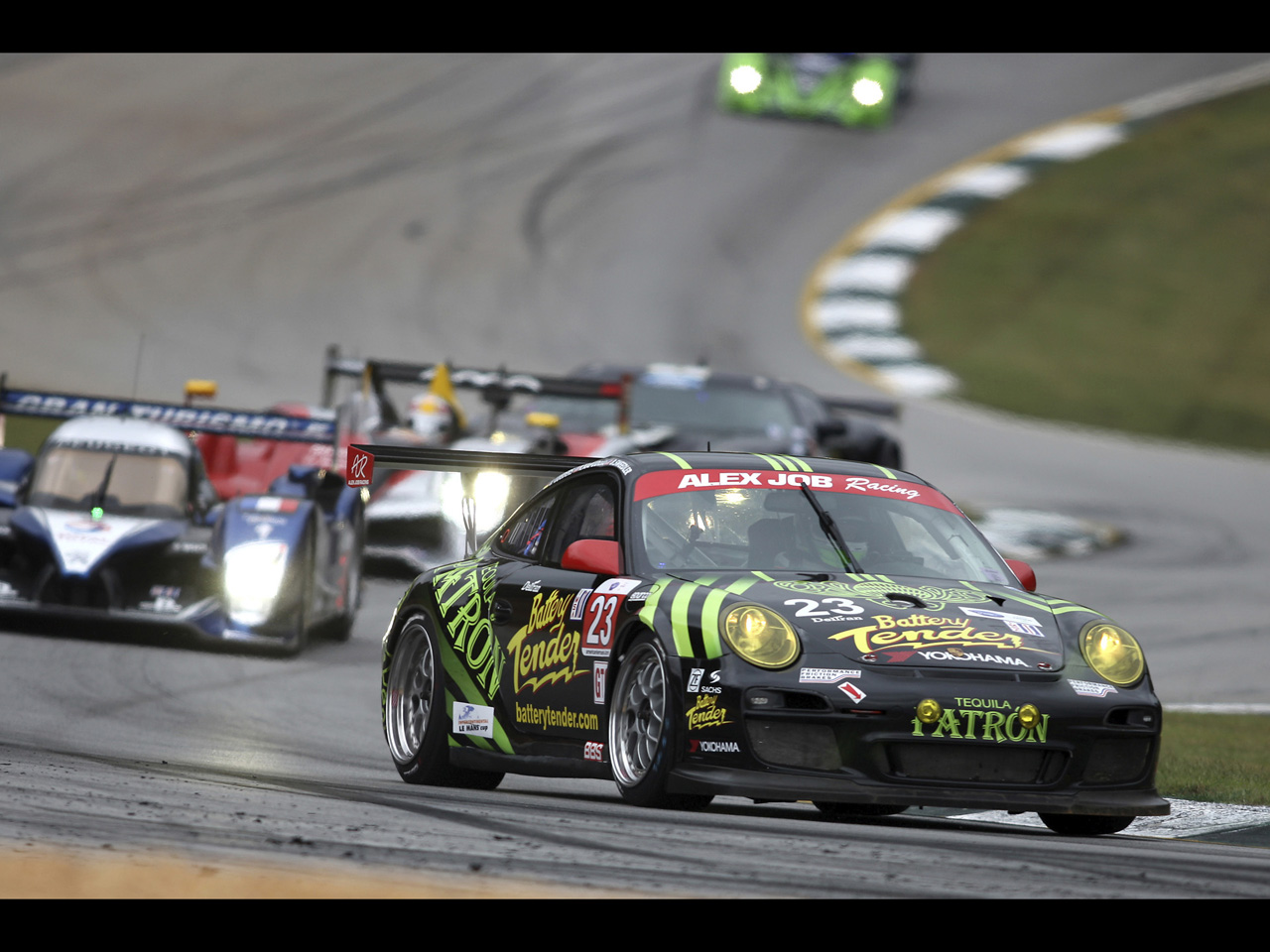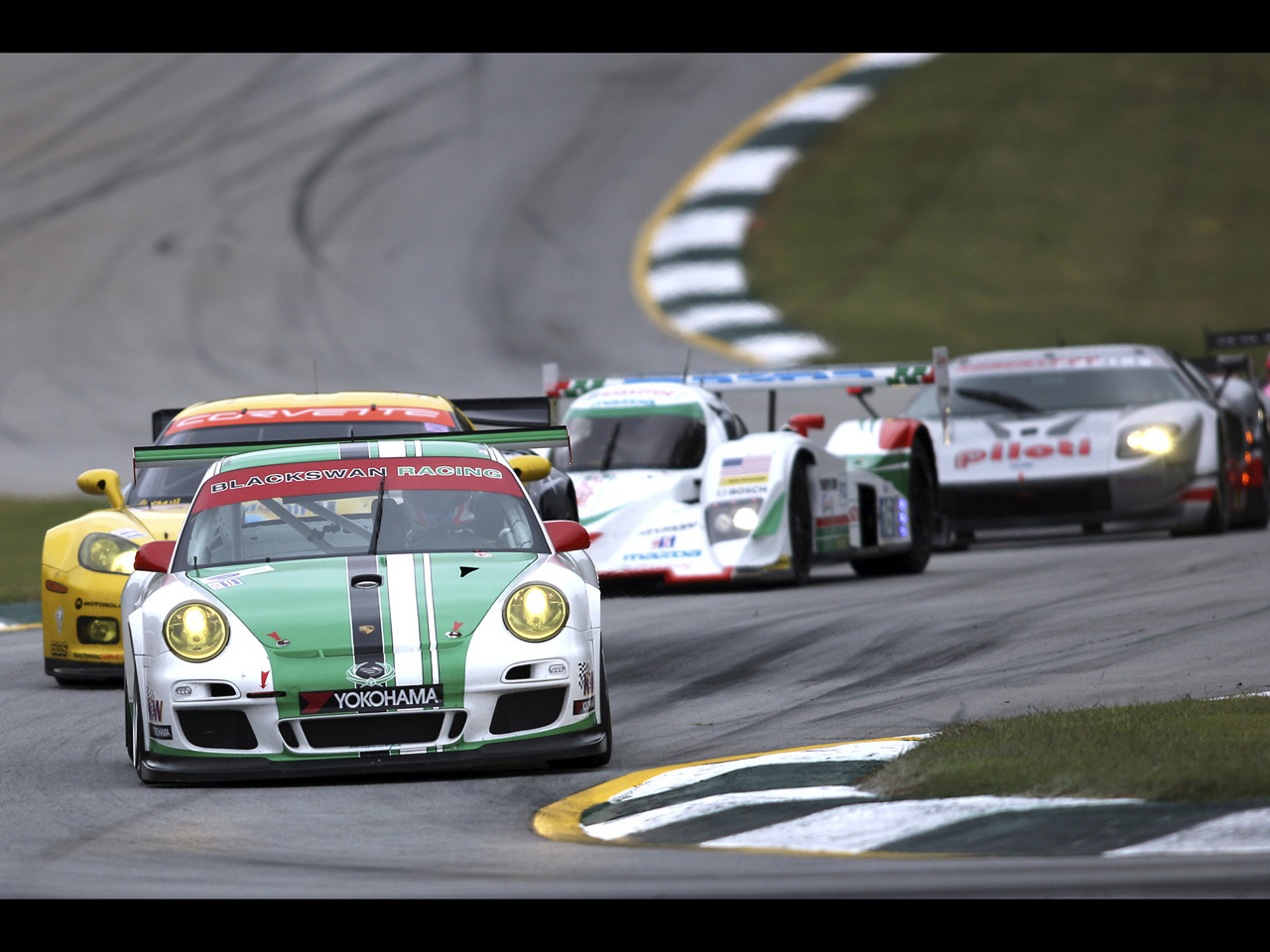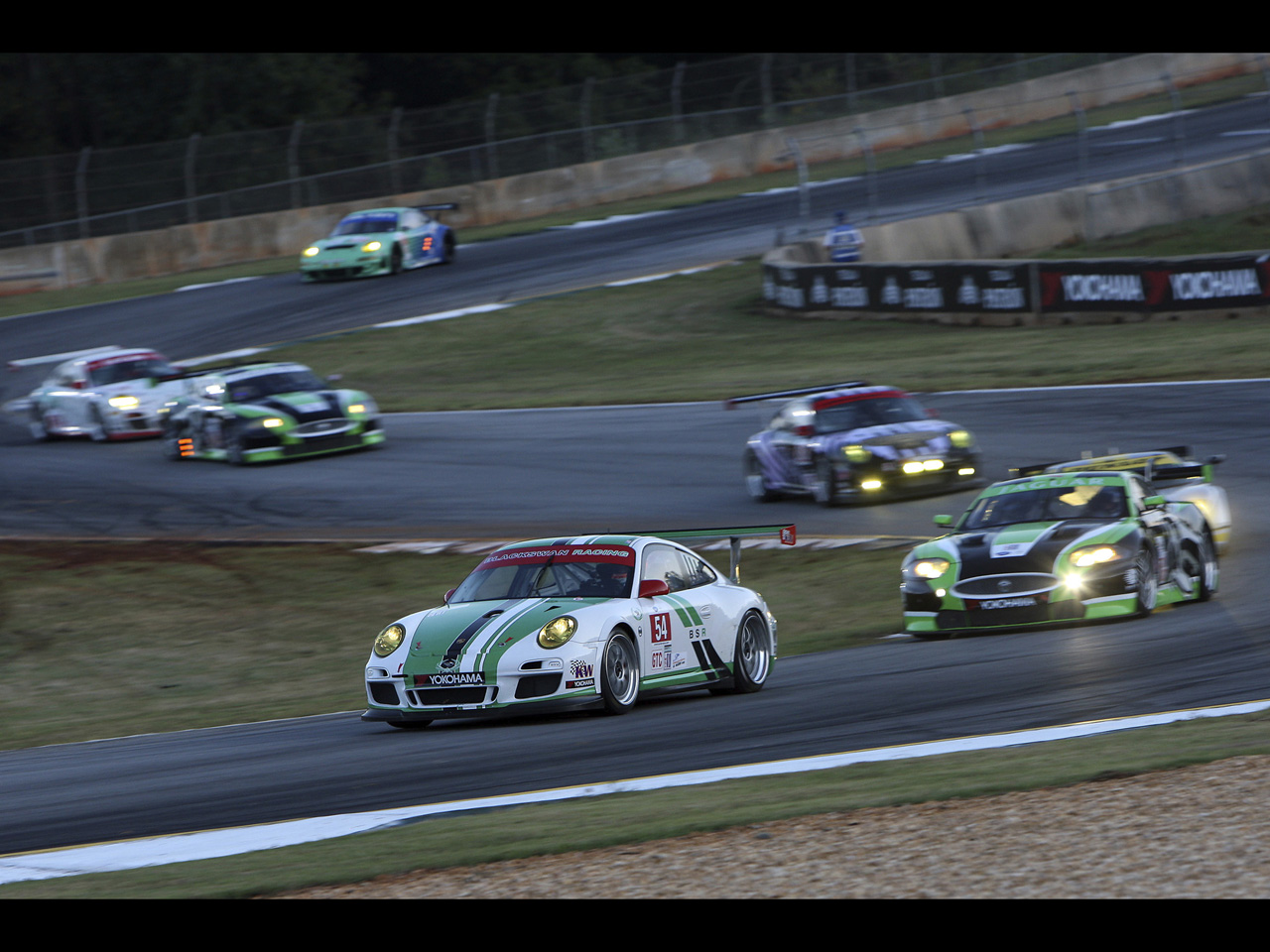2010 Porsche 911 GT3 R Hybrid Racing
|
Price |
-- |
Production |
-- | ||
|
Engine |
4 liter flat-6 |
Weight |
-- | ||
|
Aspiration |
-- |
Torque |
-- | ||
|
HP |
641 hp total (480 + 161 hp) |
HP/Weight |
-- | ||
|
HP/Liter |
120 hp per liter |
1/4 mile |
-- | ||
|
0-62 mph |
-- |
Top Speed |
-- |
(from Porsche Press
Release) Porsche 911 GT3 R Hybrid fastest and most economical
GT car
Stuttgart. A successful season finale for Porsche: At the 1,000
kilometre race in Zhuhai/China, the Porsche 911 GT3 R Hybrid
impressed once again with its performance and efficiency. The
innovative sports car from Weissach, piloted by Porsche works
drivers Joerg Bergmeister (Germany) and Patrick Long (USA), was by
far the fastest GT vehicle in the field at its eagerly awaited
premiere in Asia. Porsche factory drivers Marc Lieb (Germany) and
Richard Lietz (Austria) claimed second place in the GT2 class with
the Porsche 911 GT3 RSR on China’s oldest race track. With this
result, they secured the team championship for their Felbermayr-Proton
squad at the Intercontinental Le Mans Cup, run for the first time
this year.
“The first race in China with the 911 GT3 R Hybrid was a complete
success,” says Hartmut Kristen, Porsche Head of Motorsport. “The car
contested the entire race without the slightest technical problem.
The excellent pit stops by our factory squad from Weissach and an
absolutely perfect performance from the drivers also contributed to
this success. The development work on the hybrid system that we
conducted since the last race in Road Atlanta has paid off. Today,
we showed impressively just what potential the hybrid technology
has. This result is a great motivation for continuing our work on
the project. This was definitely not the last race for the 911 GT3 R
Hybrid.”
On the 4.319 kilometre Zhuhai International Circuit, the 911 GT3 R
Hybrid, which started in the special GTH class, was not only the
fastest but also the most economical GT vehicle. Thanks to its
ground-breaking drive concept, it made one less pit stop and
completed three more laps than the next GT opponent. “Our car ran
perfectly from the first to the last lap,” said Joerg Bergmeister.
“That was another super test of the hybrid system under race
conditions – and the most successful conclusion I could think of.”
Patrick Long, his teammate with whom he won the GT title of the
American Le Mans Series for the second time straight this season,
said: “The performance of the Porsche factory mechanics was world
class. We had the most efficient and at the same time fastest GT
car. Now, that’s what I call Porsche Intelligent Performance.”
In the GT2 class, the race for start driver Marc Lieb did not begin
very promisingly: Right in the first lap in a tussle with a Ferrari
his 911 GT3 RSR suffered tyre damage which relegated it to last
place. With a breathtaking chase through the pack, he and his
teammate Richard Lietz quickly managed to catch up with the
front-runners. At the halfway point in the race, the Felbermayr-Proton
pilots, who clinched the GT title of the Le Mans Series for the
second consecutive time this season, were already running third.
Shortly afterwards they then overtook a Ferrari.
“Unfortunately we didn’t have enough for victory, but it’s still a
great day for Porsche,” said Richard Lietz. “Obviously it was
somewhat frustrating when Marc was forced back into the pits in the
first lap with a torn-off valve. But we didn’t let that upset us and
simply concentrated on working our way up the front again. Actually,
it was huge fun - not least because our chase ended on the podium.”
Marc Lieb added: “That was almost a perfect year for our team. Today
we were very fast, but experienced a bit of bad luck early on in the
race.”
With the second 911 GT3 RSR fielded by the Felbermayr-Proton team,
Martin Ragginger (Austria), Christian Ried (Germany) and Gianluca
Roda (Italy) occupied fourth place – despite the botched and
unnecessary overtaking manoeuvre of a Peugeot prototype that forced
Martin Ragginger into the gravel trap in the last hour of the race.
The former Porsche-Junior had to pit and lost ten minutes. In the
Felbermayr-Proton camp, however, elation prevailed. “That was a
fantastic year for our team. Firstly our win in Le Mans, then the Le
Mans Series victory and now the best team in the Intercontinental Le
Mans Cup – you can’t really do more,” said Christian Ried, team boss
and driver at Felbermayr-Proton. “To be so successful, everything
has to run smoothly and that was exactly the case in our team. We
didn’t retire once. Despite never having started from pole position,
we won three races. That can only work with a good car, strong
drivers and a super team.” One of the first to congratulate the crew
was Hartmut Kristen: “I’m particularly thrilled that Felbermayr-Proton
won the team classification.”
Despite his strong drive, Richard Westbrook (Great Britain) didn’t
manage to see the flag with the Prospeed Competition 911 GT3 RSR.
The double Supercup winner and former FIA GT champion was on course
for a podium result with his teammate Darryl O’Young (Hong Kong)
when a clutch problem in the 119th lap signalled the end. “What a
shame. We were looking very good in third place,” he commented. “Our
mechanics tried their very best to repair the car but time ran out
for us.” Local hero Darryl O’Young said: “It was a fabulous
experience to drive on this track with the 911 GT3 RSR and to be
cheered by so many fans. I became more and more familiar with the
car. Under normal circumstances we would have finished on the
podium. That would have been a highlight in my career. What a shame
it didn’t work out.”
Race result GT2
class
1. Müller/Werner (D/D), BMW E92 M3, 202 laps
2. Lieb/Lietz (D/A), Porsche 911 GT3 RSR, 202
3. Bruni/Vilander/Melo (I/SF/BRA), Ferrari 430 GT, 199
4. Ragginger/Ried/Roda (A/D/I), Porsche 911 GT3 RSR, 192
5. Ehret/Quaife/Kirkaldy (D/GB/GB), Ferrari 430 GT, 191
6. Giroix/Goethe/Fatien (F/D/F), Lamborghini Gallardo, 187
Final standings team classification GT2 class
1. Felbermayr-Proton, Porsche, 72 points
2. AF Corse, Ferrari, 57
3. CRS Racing, Ferrari, 47
Final standings manufacturer classification GT2 class
1. Ferrari, 120 points
2. Porsche, 113
3. BMW, 69
Facts and Figures
This is the
Intercontinental Le Mans Cup
The newly inaugurated Intercontinental Le Mans Cup (ILMC) is open
for sports prototypes and GT vehicles, with the regulations based on
the rules of the Le Mans 24 Hours. Three long distance races are on
the ILMC calendar this season: the 1,000 kilometres of Silverstone
(Le Mans Series), the Petit Le Mans in Road Atlanta (American Le
Mans Series) and the 1,000 kilometre race in Zhuhai/China.
The starting field consists of sports prototypes and standard sports
cars. They are divided into seven classes:
LMP1 class: Sports prototypes with up to 750 hp and a minimum weight
of 900 kilograms (petrol vehicles) or 930 kg (diesel vehicles).
MP2 class: Sports prototypes with around 440 hp and an 825 kilogram
minimum weight.
GT1 class: Heavily modified standard sports cars with up to 650 hp
and a high minimum weight of 1,125 – 1,325 kilograms.
GT2 class: Slightly modified standard sports cars with 440-460 hp
and a minimum weight of 1,125 – 1,325 kilograms (e.g. Porsche 911
GT3 RSR).
Formula Le Mans: Prototype brand trophy series for the ORECA FLM 09.
GTC class: GT brand trophy vehicles of all manufacturers are
eligible to compete in this class.
GT Experimental class: Special class for innovative vehicles like
the new Porsche 911 GT3 R Hybrid.
All race cars start together but are classified separately. Points
for manufacturers and teams are allocated for placings in each
class.



